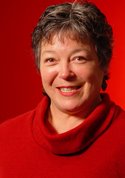Sherry - Human Behavior Fascinates Me
Sherry -

I chose a nursing education because it was affordable. It wasn’t until I was almost out of high school that I decided I needed a college education to support myself. Nursing seemed to be my only option. Luckily, the longer I attended nursing school, the more I wanted to further my education. I realized very early that hospital nursing and one-on-one care of patients was not right for me. During my diploma nursing program I did a rotation that helped me discover I had a passion for psychiatric nursing.
Research into human behavior fascinates me. That’s why I’ve stuck to it and centered my career around mental health and change management. I enjoy trying to figure out how to help people and improve processes by gathering and analyzing data to determine systems that benefit everybody.
My psychiatric experience actually began when I was 17, almost 18. It was my first time away from home and I was working in a state mental hospital across the state; a real depressing place.“Nursing provides me with many choices, and each time I feel a need to be challenged and take on a new role, many doors are ready to be opened.” I thought I came from a dysfunctional family, but being around all the patients and staff made me think maybe home wasn’t as bad as I thought. It showed me things could be worse. It wasn’t a great job; I wasn’t excited about using a key to get in and out of my workplace. The good news is I grew a lot in that job. While I didn’t like the environment, I enjoyed the college course work and my instructor was a very intelligent woman that I looked up to and considered a role model.
Because of psych training during school, my first job out of college was in an inpatient mental health unit. It was very different than the state hospital. It was one of the best working environments I’ve ever been in – group support was the team’s philosophy and staff felt valued and thrived. I promoted to other jobs and continued to grow.
Things were going fine and I was enjoying the challenge and my upward mobility. But then, the burnout hit. The city mental health agency functioned as a crisis unit and it was a dangerous environment. I didn’t personally have patient contact, but some of the people who sought medical assistance from this facility were potentially explosive. They were street people, and many were males on the outside edge of self-control. Some were delusional and hallucinating. We were a staff of mostly women, which made us feel vulnerable, but in some cases that was actually an advantage. If patients were hostile or defensive, their egos felt threatened if they encountered males, but as females we weren’t perceived as a threat. They didn’t have to protect their egos, and they were mellowed by our compassion.
Even knowing that we could usually calm the patients, we never totally felt safe and it was nerve wracking. I arranged workshops for the staff that taught them how to handle patients who lost control. We also developed an emergency plan. Both paid off when a patient went ballistic and broke all of the windows in the waiting room. Fortunately, we were well prepared and responded appropriately.
During that time one of my staff members was murdered at home. I also had to go with police on home visits and medicate psychotic people in jail. The accumulation of these incidents was too much – we were in a war zone and I needed to get out. I decided I needed to leave and try something new.
For the next twenty years I worked in private business. I worked for major companies in the areas of human factors engineering. My nursing background and knowledge definitely contributed to my success in those areas. My resume didn’t include the qualifications needed for the job, but my biomedical knowledge coupled with my ability to convince management that I was the right person for the job, allowed me to obtain the positions and excel. I worked in that area for 10 years and later in corporate safety – especially ergonomics -- for the next five years. After that, I was a lean manufacturing and quality improvement consultant for five years.
The knowledge I gained in anatomy and physiology and my longing to help people prevent injuries helped me in those jobs. I learned how hard it is to change people’s minds so I studied the change process and learned if you can get into somebody’s heart to help them see why things are going to be better, or appeal to something in their personality, then you have a much better chance of bringing about change.
I kept alive my dream to improve quality in health care so I maintained membership in the Washington State Association for Health Care Quality and recently I took an RN refresher course to get my health care feet back on the ground. I love to learn so I also earned a project management certificate.
Throughout my career I set goals, achieve what I set out to achieve, then move on to the next challenge.
I’m now pursuing a career as an advanced registered nurse practitioner. I want to practice medicine in rural areas, where communities are crying for health care professionals. I’m approaching retirement, and I want to experience a rural lifestyle, so I’ve created this new opportunity that allows me to make a difference where it is needed, while transitioning to a lifestyle I long for. Nursing provides me with many choices, and each time I feel a need to be challenged and take on a new role, many doors are ready to be opened.
Power Strategies: Challenge, Leadership, Achievement
go back to main page


0 Comments:
Post a Comment
<< Home